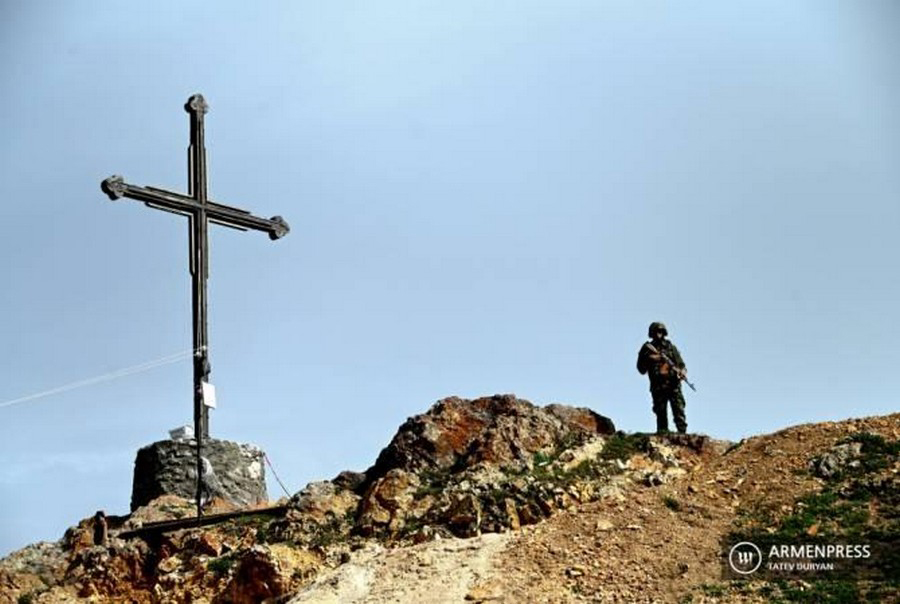The new ones have yet to be formed
In 2020, a collection dedicated to Edward Atayan was published, including the articles of the eminent philosopher and linguist and materials of other intellectuals related to him. The book is called “Our Cross,” also the name of one of Atayan’s articles. As with any good piece of writing, the headline is multifaceted. On the one hand, of course, there are biblical parallels in the sense that our nation or its best representatives carry their cross. On the other hand, the immediate meaning.
Armenia, Hayk is located at the crossroads: North (Russia), South (Iran), East (India), and West (Europe). It seems to me that no matter what regimes are in these “four directions” at the moment, spiritually, we are not only influenced by them but also, living in this essential point of the world, having our intense energy, we are called to become the concentrated embodiment of those four core and present ourselves to the world with that “synthesized” face of ours.
During these three decades, we mainly argue about the West and the North, not in terms of “spiritual synthesis” but “orientations.” While Persian and Indian spiritual cultures are equally important to us, the internal processes there are similarly fortunate. I remember years ago, I was talking to an Iranian official, and he asked me a rhetorical question: “Why do you think that the world is only influenced by heads of state or some “power centers” and not by “energy nodes” whose existence we only guess at.” And I remembered the thoughts of the Russian mystic Elena Blavatskaya about the Mahatma living in the Himalayas.
Read also
In our tragic situation, such judgments may seem too abstract and detached from life. But our crisis today, it seems to me, is primarily spiritual: we have lost that “sacred theme” (perhaps an unfortunate term, but now it will become clear what it is about), which gives us the basis for living here and to have an independent State. Without that “theme,” you can have 100 Iskanders or even nukes but still get absorbed by other states.
In that regard, I want to quote a thought from the same collection, the author of which is Professor Levon-Harutyun Abrahamyan (my father). Remembering the excitement that the Karabakh movement caused in Atayan, he adds: “In the 1990s, the meaning of that movement was clear to us; it was united: it was an opportunity for the people to purify themselves, to become more than what they are.” Our last “sacred topic” is Artsakh. The rest of the themes had similar ambitions but worked differently.
In the 20th century, our prominent thinkers, Hayk Asatryan and Garegin Nzhdeh, were searching for those “themes.” But neither Taronism (making the story of Vardan Mamikonyan “sacred”) nor Tseghakronism -tribalism (the plans to build temples of the god Vahagn) did not acquire the status of a “topic.” There are many reasons, including the fact that these ideas were propagated by the ruling RPA (Republican Party of Armenia) which was far from them. When Brezhnev spoke about communism, RPA members spoke about tribalism, and now Pashinyan spoke about Armenia’s independence and sovereignty; they are the same phenomena: building a “theme” on falsehood and lies is impossible.
But it is quite possible to “spoil.” Artsakh, the “sacred theme” at the base of the Third Republic, was also spoiled and disappeared for various reasons. Of course, the behavior of Robert Kocharyan and Serzh Sargsyan and their entourage played their role, and then, starting from the autumn of 2007, the purposeful and ferocious anti-Artsakh propaganda. That’s how we got to today when it is almost officially said that Artsakh and the people of Artsakh are “colorless – unhappy,” and it is not worth fighting for them.
The authorities quietly push their theses: “The people of Artsakh are pro-Russian, that’s why they get it,” “We gave you weapons, but you didn’t fight,” and so on. And it is accepted as usual and not seen as anti-humanism and cannibalism. You cannot make “independence and sovereignty” a “sacred topic,” but it is quite possible to convince that the people of Artsakh are bad and the cause of all misfortunes.
For me, who preaches what doesn’t matter: Today, they say one thing; tomorrow, something else. It is essential that the Armenian language teacher in Gyumri urges the student who is ready to revolt: “What do you need? Where are you? Where is Artsakh?” (By the way, Syunik is also quite far from Gyumri). A soldier brought up with such a spirit will fight not only for Artsakh but also for the Republic of Armenia. Even if, I repeat, our republic has atomic weapons, we will not be able to protect our sovereignty. In short, the Artsakh topic as a “sacred idea” has been exhausted. What can motivate our people to “purify themselves, become more than what they are,” I naturally do not know. Even if I suggest something, it will do little good. Not by suggestion; it should mature naturally.
Aram ABRAHAMYAN
“Aravot” daily, 26.09.2023





















































